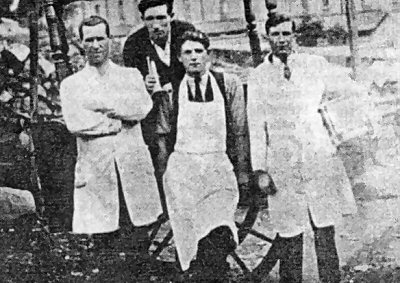A number of my friends of long-standing on this site – Carmel, Sally, Jenny, Olwen, Irene, Jim, to name but a few – being aware of my recent bout of ill-health, have offered various prognoses and thankfully, a few tips, as well as copious words of support.
‘Doctors are blaming a rare electrical imbalance in the brain for the bizarre death of a chess player whose head literally exploded in the middle of a championship game. No one else was hurt in the fatal explosion, but four players and three officials at the Moscow Candidate Masters’ Chess Championships were sprayed with blood and brain matter when Nikolai Titov’s head suddenly blew apart. Experts say he suffered from a condition called Hyper-Cerebral Electrolysis, or HCE.
“He was deep in concentration with his eyes focused on the board,” said Titov’s opponent, Vladimir Dobrynin. “Suddenly his hands flew to his temples and he screamed in pain. Then, as if someone had put a bomb in his cranium, his head popped like a firecracker.”
Incredibly, Titiov’s is not the first case in which a person’s head has spontaneously exploded. Five people are known to have died of HCE in the last 25 years. The most recent death occurred in 1991, when European psychic Barbara Nicole’s skull burst. Miss Nicole’s story was reported by newspapers worldwide.
“HCE is an extremely rare physical imbalance,” said Dr. Anatoly Martinenko, famed neurologist and expert on the human brain, who performed the autopsy on the brilliant chess expert. “It is a condition in which the circuits of the brain become overloaded by the body’s own electricity. The explosions happen during periods of intense mental activity when current is surging through the brain. Victims are intelligent people with great powers of concentration. Both Ms. Nicole and Mr. Titov were intense people who tended to keep their cerebral circuits overloaded.
They were literally too smart for their own good.”
Although Dr. Martinenko says there are probably many undiagnosed cases, he hastens to add that very few people will die from HCE. “Most people who have the condition never realize it. Medical science still doesn’t know much about HCE, and since fatalities are so rare, it will be years before research money becomes available.”
In the meantime, the doctor urges people to take it easy and not think too hard for long periods of time.
For my own part, despite the fact that I had almost decided to join, I’m having second thoughts now about joining the Breffni Bridge Club down at the Gateway (where I’m currently the lowliest of learners!).
The atmosphere virtually sparks with brain static. You should feel the intensity there!
On second thoughts though, maybe not!
In the meantime, be aware of the following Basic Guide.
How to Tell if Your Head’s About To Explode
Although HCE is very rare, it can kill. Dr. Martinenko says that being aware of the condition can greatly improve your odds of surviving it. A yes answer to any three of the following questions could mean that you have HCE:
1. Does your head sometimes ache when you think too hard?
Head pain can indicate overloaded brain circuits.
2. Do you ever hear a faint ringing or humming sound in your ears?
It could be the sound of electrical activity in the skull cavity.
3. Do you sometimes find yourself unable to get a thought out of your head?
This is a sign of too much electrical activity in the cerebral cortex.
4. Do you spend more than five hours a day reading, balancing your accounts, ‘surfing’ this and other sites or other thoughtful activity?
A common symptom of HCE is a tendency to over-use the brain.
5. When you get angry or frustrated, do you feel pressure in your temples? Friends of people who died of HCE say the victims often complained of head pressure in times of strong emotion.
6. Do you over-eat ice cream, doughnuts and other sweets? A Homeresque craving for sugar is typical of people with too much electrical pressure in the cranium.
7. Do you tend to analyze yourself too much?
HCE sufferers are often introspective, over-reflective of their lives.
8. Do you often make silly lists like this and then take them seriously?
There are some even more basic pointers that your head may be about to explode.
1. Is there a high-velocity weapon pointing in your direction?
2. Are you driving recklessly on a dangerous road?
3. Are you wearing an explosives belt round your middle?
Finally, a salutary story in the same vein from my favourite holiday destination.
HCE may have been this law officer’s problem!!
A Turkish policeman recently accidentally shot himself dead as he scratched his head with his pistol.
The 24-year-old
The good news is that it sure cured that itch!!
